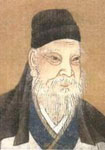分类: 九日

孟浩然(689-740),男,汉族,唐代诗人。本名不详(一说名浩),字浩然,襄州襄阳(今湖北襄阳)人,世称“孟襄阳”。浩然,少好节义,喜济人患难,工于诗。年四十游京师,唐玄宗诏咏其诗,至“不才明主弃”之语,玄宗谓:“卿自不求仕,朕未尝弃卿,奈何诬我?”因放还未仕,后隐居鹿门山,著诗二百余首。孟浩然与另一位山水田园诗人王维合称为“王孟”。
卢明府九日岘山宴袁使君、张郎中、崔员外
宇宙谁开辟,江山此郁盘。
Who created the universe? This land is surrounded by mountains.
登临今古用,风俗岁时观。
Climbing this mountain, one can appreciate the customs and traditions of different times and seasons.
地理荆州分,天涯楚塞宽。
Geographically, Jingzhou is divided, and the boundaries of Chu extend to the ends of the earth.
百城今刺史,华省旧郎官。
Now the hundred cities have new governors, and the old officials of the imperial court have retired.
共美重阳节,俱怀落帽欢。
We gather together to celebrate the Double Ninth Festival, wearing the traditional chrysanthemum hats, and enjoying the festivities.
酒邀彭泽载,琴辍武城弹。
We invite friends from Pengze to join us, drinking and playing the qin in Wucheng.
献寿先浮菊,寻幽或藉兰。
We offer chrysanthemums to celebrate long life, and we seek tranquility and beauty among the orchids.
烟虹铺藻翰,松竹挂衣冠。
The misty rain creates a backdrop for our elegant writing brush, and we dress ourselves with pine and bamboo.
叔子神如在,山公兴未阑。
The spirit of the immortal is with us, while the mountain god's excitement has not subsided.
传闻骑马醉,还向习池看。
It is rumored that someone got drunk while riding a horse, and returned to Xichi to take a look.
这首诗是唐代诗人孟浩然在岘山举办的宴会上所作。诗人通过描绘宴会的景象和氛围,表达了对友谊的珍视和对自然美景的赞美。
诗中,诗人首先谈到宇宙的起源和山脉环绕着这片土地,表达了对大自然的敬畏之情。接着,诗人描述了岘山的壮丽景色和举办宴会的意义,将宴会看作是分享和体验风俗和传统的场所。诗人还提到了地理上的划分和政治上的变化,暗示时光流转,事物不断变迁。
然后,诗人描绘了重阳节庆祝活动的热闹场面和宴会上欢聚的情景,以及通过酒和音乐的邀请,增加了宴会的喜悦氛围。
最后,诗人表达了对长寿和寻求宁静美景的愿望,并通过比喻描述了诗人的文人气质和对自然的热爱。
整首诗抒发了诗人对友谊、自然和传统的珍视,以及对美好和安宁的追求。通过描述宴会中的各种景象和情景,诗人展现了自己对人生和自然的思考和感悟。
lú míng fǔ jiǔ rì xiàn shān yàn yuán shǐ jūn zhāng láng zhōng cuī yuán wài
卢明府九日岘山宴袁使君、张郎中、崔员外
yǔ zhòu shuí kāi pì, jiāng shān cǐ yù pán.
宇宙谁开辟,江山此郁盘。
dēng lín jīn gǔ yòng, fēng sú suì shí guān.
登临今古用,风俗岁时观。
dì lǐ jīng zhōu fēn, tiān yá chǔ sāi kuān.
地理荆州分,天涯楚塞宽。
bǎi chéng jīn cì shǐ, huá shěng jiù láng guān.
百城今刺史,华省旧郎官。
gòng měi chóng yáng jié, jù huái luò mào huān.
共美重阳节,俱怀落帽欢。
jiǔ yāo péng zé zài, qín chuò wǔ chéng dàn.
酒邀彭泽载,琴辍武城弹。
xiàn shòu xiān fú jú, xún yōu huò jí lán.
献寿先浮菊,寻幽或藉兰。
yān hóng pù zǎo hàn, sōng zhú guà yì guān.
烟虹铺藻翰,松竹挂衣冠。
shū zǐ shén rú zài, shān gōng xìng wèi lán.
叔子神如在,山公兴未阑。
chuán wén qí mǎ zuì, hái xiàng xí chí kàn.
传闻骑马醉,还向习池看。